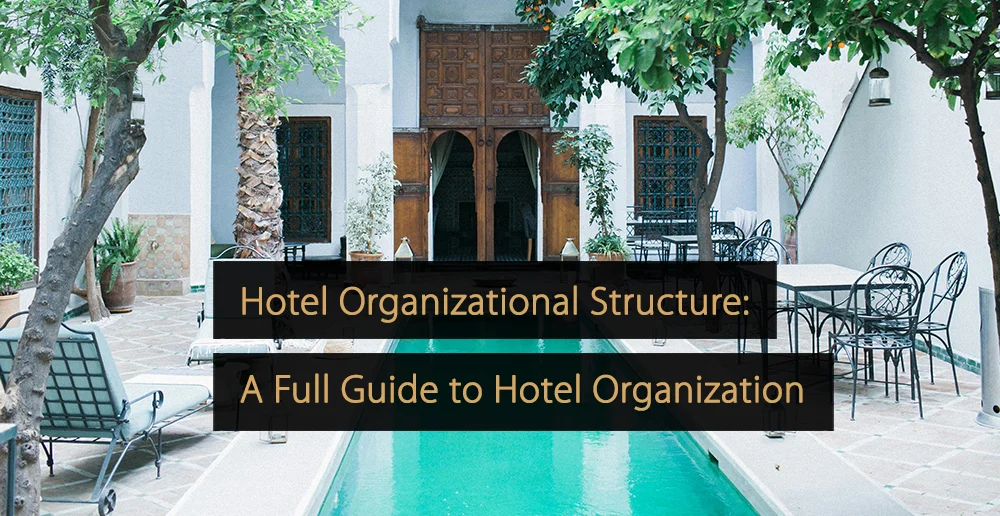Hotel owners have an important role, as they are ultimately responsible for the business and ensuring the right employees are working in the right areas. In this article, you will learn about the role of a hotel owner, find out about hotel management companies, and explore different hotel management structures.
Table of Contents:
- What is the Hotel Industry?
- The Role of Hotel Owners
- Hotel Owners and Hospitality Management Companies
- Different Hotel Management Structures
- What Are the Responsibilities of Hotel Owners?
- General Manager: A Hotel Owner’s Right Hand
- Hotel Owner’s Guide to Technology Advancements for Different Departments
- How Hotel Owners Can Solve Staffing Shortages
What is the Hotel Industry?
The hotel industry describes a section of the service industry, based around providing temporary guest accommodation and related services. Businesses within the hotel industry will provide guests with a place to enjoy overnight stays, on a short-term basis, in exchange for money.
By most accepted definitions, the hotel industry encompasses all forms of temporary accommodation for paying customers, including hotels, motels, bed and breakfasts, guest houses, inns, and more. In addition to providing a bed, it is common for guest services to include food and beverage services, entertainment, and leisure offerings.
In the article “Hotel Industry: Everything You Need to Know About Hotels!” you will be able to learn much more about how the hotel industry is defined, the different types of accommodation that fall within this definition, tech trends disrupting the industry, marketing strategies that can help managers or hotel owners, and much more.
The Role of Hotel Owners
Hotel owners are the individuals or entities that own hotel businesses. Again, this definition will generally include all business types that fall under the hotel industry umbrella, including hotels, motels, inns, and guest houses. Ultimately, owners are responsible for overseeing all issues related to a property or portfolio.
This can include obtaining the necessary business licenses, ensuring the property is well-maintained, investing in improvements or expansions, and all core hotel operations. With that being said, owners of large hotels, or hotel chains will often delegate responsibility to employees, including hotel managers and management teams.
In smaller properties, such as small hotels, inns, or bed and breakfasts, it is common for owners to take a more ‘hands-on’ approach to many of the duties they are ultimately responsible for. This could include assisting with customer service tasks and core business operations while employing a much smaller team to assist them.
Video: Best Advice on How to Succeed In the Hotel Industry
Hotel Owners and Hospitality Management Companies
The most basic arrangement for a hotel owner is to own the physical hotel building or buildings themselves and take responsibility for operations, even if they delegate specific tasks to employees. However, many hotel owners are turning to hotel management companies to assist with running their properties.
In many cases, the agreement between the two parties will stipulate that the management company takes responsibility for day-to-day operations. At the same time, the hotel owner surrenders control and takes a backseat. Generally, the management company will be given financial incentives to keep the business profitable or grow.
With that being said, there can be disputes between owners and the management companies they turn to, and there are times when the priorities of a management company may not necessarily align perfectly with an owner’s priorities. This is why hotel owners need to choose management companies carefully and negotiate decision-making powers.
Different Hotel Management Structures
Hotel ownership can be more complicated than it initially seems, as several different hotel management structures involve hotel owners, brand managers, and hotel management companies.
Franchised Hotel
A franchised hotel is an arrangement where the hotel owner is a franchisee, while the brand owner or manager is the franchiser. With this arrangement, the hotel owner pays to use the brand owner or brand manager’s brand name, trademarks, intellectual property, products, services, and overall business model.
With this arrangement, the owner usually pays upfront and ongoing franchise fees to use the branding but has control of the property itself. Nevertheless, franchise hotel owners are typically required to comply with brand standards and existing brand concepts and are restricted in their creative decision-making. Meanwhile, the brand manager remains solely an asset owner who outsources responsibility for day-to-day operations to the franchisee.
Managed Hotel
A managed hotel is an arrangement where the hotel owner owns the real estate but hires a management company actually to operate the hotel. The management company fulfills its own role, and also serves as a brand manager. They typically apply their brand name to the property and take responsibility for core hotel operations.
This arrangement suits hotel owners primarily focused on property, rather than business management. The property they own is utilized by a hotel management team with experience in this area – often with an established brand identity. The management team is then given financial incentives to operate a profitable business.
Owned Hotel
Finally, an owned hotel is a hotel that is owned, branded, and managed by the same individual or the same company. With this approach, the owner assumes control of the real estate, the brand, and the day-to-day operations, meaning they are responsible for maintaining the property and the financial results.
Of course, owners or ownership groups can still delegate tasks and employ people to oversee specific activities. This approach provides hotel owners with the greatest overall amount of control. However, it also brings the highest level of risk because they are ultimately responsible for the ownership, management, and operations.
What Are the Responsibilities of Hotel Owners?
A hotel owner is primarily concerned with the continued success of their hotel or guest accommodation, but this does mean that owners have many different responsibilities. They are required to obtain the necessary licensing and maintain compliance with laws and regulations, they must handle the upkeep of the property itself, and they will also need to manage financial performance through budgeting, revenue management, and more.
While owners are ultimately responsible for the overall business operations of a hotel, they will typically employ department managers and even hotel managers to handle specific tasks. Owners must also oversee recruitment efforts, stay current with emerging hotel trends, and ensure that individual departments have everything they need.
Beyond this, there is a need to invest in equipment and the latest hotel technology to meet customer expectations and better manage reputation. On a strategic level, owners must compete with rival properties and may need to handle marketing efforts or hire marketing professionals to handle advertising and distribution.
General Manager: A Hotel Owner’s Right Hand
For hotel owners with large properties, or large-scale operations, it is relatively common for the day-to-day operations to be overseen by a general manager. Such an arrangement usually sees the general manager as the owner’s right hand, reporting directly to them and fulfilling their wishes.
With this approach in place, the role of the general manager is essentially to oversee all of the activities within the hotel and ensure things run smoothly. This makes the role itself quite broad in terms of its focus, and requires a deep understanding of the hotel industry, as well as a knowledge of the different hotel departments.
On any given day, a general manager may need to handle strategic decisions, assist with marketing or distribution efforts, help to deliver customer service, or assist the restaurant or bar staff. On top of this, general managers need to ensure the hotel or accommodation they offer is clean and safe, with everything working as it should.
Hotel Owner’s Guide to Technology Advancements for Different Departments
Different hotels or similar property departments will need to use different technology. Hotel owners need to know what to invest in, who to provide the technology for, and why.
Front Office Technology
Within most hotels, the front office department serves as the main point of contact for customers, and hotel owners need to invest in the right technology solutions to aid this. For instance, in recent times, self-check-in desks have become more common, while cloud technology can help to power mobile devices and a high-quality hotel PMS.
In the article “Front Office Technology: The Latest Tech for the Reception Department”, you will be able to find out about these technology solutions and many others, and gain an understanding of how they help the front office.
Restaurant Technology
Hotel owners with larger properties must also invest in the technology required to run a restaurant and meet customer expectations successfully. Examples include cloud-based restaurant POS systems, digital display screens for kitchen staff, online ordering solutions, and tools allowing for QR code scanning.
In the article “Latest Restaurant Technology Trends You Need to Know About”, you can explore much more on this subject and learn about the most important technology investments to assist hotel restaurants.
Housekeeping Technology
The housekeeping department has one of the most crucial roles within any hotel, helping to provide guests with a clean and safe environment. Of course, their efforts can be greatly aided if a hotel owner invests in the right technology, including housekeeping software, air purifiers, and sustainable vacuum cleaners.
In the article “Housekeeping Technology; The Latest Tech Used in Hotel Housekeeping”, you can explore the various tech solutions hotel housekeeping teams use and understand why investment is beneficial.
How Hotel Owners Can Solve Staffing Shortages
One of the big challenges for hotel owners and managers, especially since the COVID-19 pandemic disrupted the industry, has been staffing shortages. Such shortages have been caused by unsteady work driving people away from the industry, the continued spread of the virus itself, and various other factors.
In the article “How to Solve Staffing Shortages in the Hospitality Industry with Technology”, you can learn about technology solutions’ role in helping hotels and similar businesses cope.
Hotel owners are ultimately responsible for all business operations connected to a hotel, although different arrangements mean they may delegate responsibility to employees or third-party management companies. Nevertheless, the decisions taken by owners will greatly influence financial outcomes and guest satisfaction.
More Tips to Grow Your Business
Revfine.com is the leading knowledge platform for the hospitality and travel industry. Professionals use our insights, strategies, and actionable tips to get inspired, optimize revenue, innovate processes, and improve customer experience.Explore expert advice on management, marketing, revenue management, operations, software, and technology in our dedicated Hotel, Hospitality, and Travel & Tourism categories.
This article is written by:
Hi, I am Martijn Barten, founder of Revfine.com. With 20 years of experience in the hospitality industry, I specialize in optimizing revenue by combining revenue management with marketing strategies. I have successfully developed, implemented, and managed revenue management and marketing strategies for individual properties and multi-property portfolios.









Leave A Comment